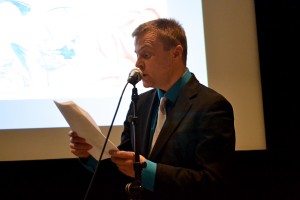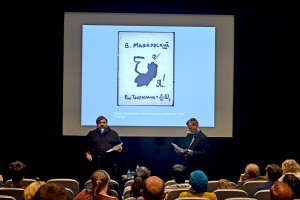 On November 2-3, poet Christian Bök (Canada) visited Northwestern for two popular events.
On November 2-3, poet Christian Bök (Canada) visited Northwestern for two popular events.
November 2nd, 6:00 P.M., Block Gallery:
Beyonsense with Christian Bök and Ilya Kutik
Listen to a recording of Bök and Kutik’s reading here.
Nina Gourianova, Assistant Professor of Russian, introduced the event with a look at Russian Futurist book art, focusing on the many books displayed in the Block Museum of Art‘s concurrent exhibit, “Tango with Cows: Book Art of the Russian Avant-Garde, 1910–1917.” Beyonsense is translator Paul Schmidt’s clever translation of the Russian neologism zaum, a tendency towards the “destruction” of semantically meaningful language in the avant-garde poetry of Russian Futurists Aleksei Kruchonyk and Velemir Khlebnikov. The “Beyonsense” event offered a lively exploration of the connections between these Futurists of the early 20th century and the sound poetry of the contemporary moment. Northwestern’s own Ilya Kutik read the great classics of the zaumniks, such as Kruchonyk’s “Dyr Byr Schul” and Khlebnikov’s “Incantation by Laughter,” and Christian Bök read their “English” translations, in so far as the zaum poems can be said to have a clear identity in any given natural language. Kutik followed up with readings from his own sound-oriented poetry, and Bök offered the audience bravura renditions of historically important sound poems such as the Ursonata of Kurt Schwitters, as well as a broad sampling of his own poetry, which includes hymns written in invented languages commissioned by Canadian television programs, and his sustained work-in-progress, The Cyborg Opera.
November 3rd, 12:00 noon, University Hall 201 (Hagstrum Room):
PPC workshop with Bök
In this workshop, Bök presented material from “The Xenotext Experiment,” his newest work, which involves encoding poetry into the DNA of a live bacterium (Deinococcus radiodurans — “the world’s toughest living thing”). Along with a brief primer in microbiology and genetics, the Poetry and Poetics Colloquium was treated to a series of “Borgesian fabulae” about the attempt to create–and “publish”–a poem with the potential to outlast human civilization. The work of nearly a decade, Bök’s “Xenotext” involves the creation of a coding system that would allow the encipherment of a poem that, when implanted in a host bacterium would, in turn, cause the bacterium to “respond” with a paired poem. It is to be the first “mutually enciphered” poems in English, according to Bök. For example, Bök’s system allows the following two couplets to be mutually encoded:
any style of life the faery is rosy
is prim of glow
There is a growing archive of Bök’s reflections and interviews, as well as journalism and emergent scholarship on the Xenotext Experiment as Bök brings it to fruition. A few links follow.

John Barber, “Bök v. Bug,” The Globe and Mail (2010)
Christian Bök, “The Xenotext Experiment,” (2008) 5:2 SCRIPTed 227
Christian Bök,”The Xenotext Works,” Harriet (2011)
Christian Bök, “The Untimeliness of the Xenotext,” Harriet (2011)
Allison Carruth, “The Xenotext,” Arcade (5 July, 2011)
Photos courtesy of Angela Meiquan Wang

